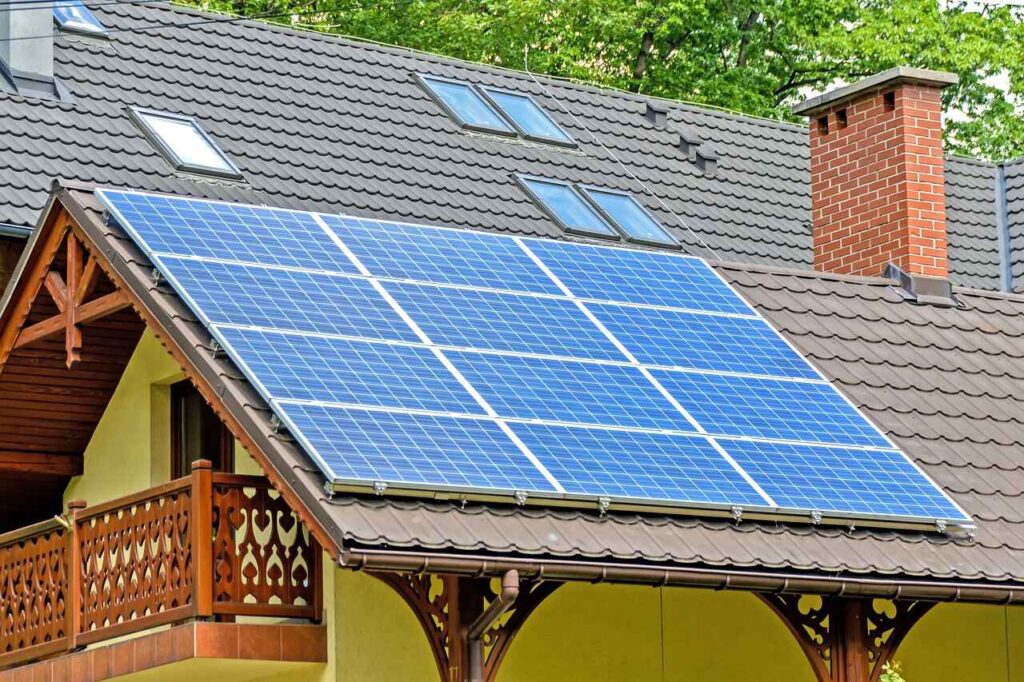Cost of Solar Panels for 5 Bedroom House: Affordable Energy Solution
The cost of solar panels for a 5-bedroom house typically ranges from $15,000 to $25,000. This estimate includes installation.
Solar panels offer an efficient way to reduce energy bills and lower carbon footprints. For a 5-bedroom house, the energy needs are higher, making solar panels a practical investment. Solar systems can provide a consistent energy supply and long-term savings. The initial cost might seem high, but the benefits outweigh the expenses over time.
Solar panels increase property value and offer an eco-friendly energy solution. Investing in solar power is both financially and environmentally advantageous. Consider consulting with a professional installer for a precise quote and tailored advice.

Introduction To Solar Panels
Solar panels convert sunlight into electricity. They help power homes efficiently. Installing solar panels is a smart move. They can lower your electricity bills. A 5-bedroom house can benefit greatly from solar energy.
Benefits Of Solar Energy
Solar energy has many advantages. Here are some key benefits:
- Cost Savings: Solar energy reduces your electricity bills.
- Renewable Source: Solar power is renewable and sustainable.
- Low Maintenance: Solar panels require minimal upkeep.
- Energy Independence: You can generate your own power.
Environmental Impact
Solar energy is environmentally friendly. It reduces carbon footprints. Solar panels produce clean energy. They do not emit greenhouse gases. Using solar power helps combat climate change.
Here is a table to show the environmental benefits:
| Benefit | Description |
|---|---|
| Reduced Emissions | No harmful gases are emitted. |
| Conserves Resources | Uses sunlight, a renewable resource. |
| Less Pollution | Reduces air and water pollution. |
Understanding Energy Needs
Understanding the energy needs of a 5-bedroom house is crucial. This helps in deciding the right size and cost of solar panels. Proper estimation ensures efficient energy usage and cost savings.
Energy Consumption Of A 5 Bedroom House
A 5-bedroom house typically uses more energy. Each room may have multiple devices. Commonly used appliances include:
- Refrigerators
- Air conditioners
- Heaters
- Washing machines
- Televisions
Let’s break down the average energy consumption:
| Appliance | Average kWh per Month |
|---|---|
| Refrigerator | 150 kWh |
| Air Conditioner | 300 kWh |
| Heater | 200 kWh |
| Washing Machine | 50 kWh |
| Television | 100 kWh |
The total monthly consumption may vary. It depends on appliance usage and family habits.
Factors Influencing Consumption
Several factors can influence energy consumption in a house. Understanding these factors helps in better planning for solar panel installation. Key factors include:
- Number of Occupants: More people increase energy usage.
- Appliance Efficiency: Older appliances use more energy.
- Weather Conditions: Extreme weather increases heating and cooling needs.
- Daily Habits: Frequent use of high-energy devices spikes consumption.
- Home Insulation: Poor insulation leads to higher heating/cooling needs.
By understanding these factors, you can better estimate your energy needs. This helps in choosing the right solar panel system for your home.
Types Of Solar Panels
Choosing the right solar panels for your 5-bedroom house is important. Three main types of solar panels dominate the market: Monocrystalline, Polycrystalline, and Thin-Film. Each type has its own benefits and drawbacks. Understanding these can help you make an informed decision.
Monocrystalline Panels
Monocrystalline panels are made from a single crystal structure. They are known for their high efficiency and sleek appearance. These panels can convert more sunlight into electricity compared to other types.
- Efficiency: High, ranging from 15-20%
- Cost: Higher than other types
- Lifespan: Around 25-30 years
Polycrystalline Panels
Polycrystalline panels are made from multiple crystal structures. They are generally less efficient but more affordable. These panels are a good option for larger roof spaces.
- Efficiency: Moderate, ranging from 13-16%
- Cost: Lower than Monocrystalline panels
- Lifespan: Around 20-25 years
Thin-film Panels
Thin-Film panels are made from a variety of materials. They are flexible and lightweight. These panels are easier to install but less efficient.
- Efficiency: Low, ranging from 10-12%
- Cost: Usually the cheapest
- Lifespan: Around 10-20 years
Below is a table summarizing the key differences:
| Type | Efficiency | Cost | Lifespan |
|---|---|---|---|
| Monocrystalline | 15-20% | High | 25-30 years |
| Polycrystalline | 13-16% | Moderate | 20-25 years |
| Thin-Film | 10-12% | Low | 10-20 years |
Initial Costs Breakdown
Understanding the initial costs of solar panels for a 5-bedroom house is crucial. This section breaks down the expenses into three main categories: Cost of Panels, Installation Costs, and Additional Equipment. Knowing these costs helps you make an informed decision.
Cost Of Panels
The cost of solar panels varies by brand and efficiency. For a 5-bedroom house, you need more panels. Typically, prices range from $15,000 to $25,000. The price includes the panels and necessary hardware.
Here is a simple table to illustrate potential costs:
| Brand | Cost |
|---|---|
| Brand A | $15,000 |
| Brand B | $20,000 |
| Brand C | $25,000 |
Installation Costs
Installation costs cover labor and permits. Installation for a 5-bedroom house ranges from $5,000 to $10,000. This includes professional labor, permits, and inspection fees.

An ordered list of installation costs:
- Labor: $3,000 to $6,000
- Permits: $500 to $1,000
- Inspection: $1,000 to $3,000
Additional Equipment
Additional equipment includes inverters and batteries. Inverters convert solar energy to usable electricity. Batteries store excess energy for later use. The cost of additional equipment ranges from $3,000 to $7,000.
Here is a bullet-point list of additional equipment costs:
- Inverter: $1,000 to $3,000
- Battery: $2,000 to $4,000
These components ensure your solar system functions optimally.
Long-term Savings
Installing solar panels on a 5-bedroom house can yield substantial long-term savings. By generating your own electricity, you can significantly reduce or even eliminate monthly energy bills. This investment not only helps the environment but also enhances your financial health over time.
Reduction In Energy Bills
Solar panels reduce your reliance on the grid. As a result, your energy bills decrease. The savings can be substantial, especially for large homes. Below is an example of potential monthly savings:
| Month | Energy Bill without Solar | Energy Bill with Solar | Savings |
|---|---|---|---|
| January | $200 | $50 | $150 |
| February | $180 | $45 | $135 |
| March | $220 | $55 | $165 |
Return On Investment
The initial costs of solar panels can be high. Yet, they offer excellent returns over time. Here’s a breakdown:
- Initial Cost: $15,000
- Annual Savings: $2,000
- Payback Period: 7.5 years
After the payback period, the savings are pure profit. Solar panels increase home value. They make your house more attractive to buyers. Thus, the investment in solar panels pays off in multiple ways.
Maintenance And Lifespan
Solar panels for a 5-bedroom house are a great investment. They reduce energy costs and benefit the environment. Understanding maintenance and lifespan is crucial for maximizing their benefits.
Routine Maintenance
Routine maintenance keeps solar panels efficient. Clean the panels every six months. Use water and a soft brush. Ensure no debris blocks sunlight. Check for cracks or damage. Inspect electrical components yearly. A professional can handle this.
| Maintenance Task | Frequency |
|---|---|
| Cleaning Panels | Every 6 months |
| Inspecting for Damage | Yearly |
| Checking Electrical Components | Yearly |
Expected Lifespan Of Panels
Solar panels last a long time. They usually function for 25-30 years. Over time, their efficiency drops slightly. After 25 years, they may work at 80% capacity. Proper maintenance extends their lifespan.
- Initial Efficiency: 100%
- After 25 Years: 80% efficiency
Replacing old panels keeps energy production high. Consider panel warranties. Many offer 25-year warranties. This ensures long-term reliability.
Real-life Case Studies
Exploring real-life case studies helps to understand the cost of solar panels for a 5-bedroom house. These stories reveal the financial benefits and user experiences. Let’s dive into some successful installations and hear from actual users.
Successful Installations
Here are some examples of successful solar panel installations for 5-bedroom homes:
| Location | System Size (kW) | Installation Cost | Annual Savings |
|---|---|---|---|
| California | 10 kW | $20,000 | $2,500 |
| Texas | 8 kW | $16,000 | $2,000 |
| Florida | 9 kW | $18,000 | $2,200 |
In California, a 10 kW system costs $20,000 and saves $2,500 annually. In Texas, an 8 kW system cost $16,000 and saved $2,000 yearly. In Florida, a 9 kW system costs $18,000 and saves $2,200 per year.
User Testimonials
Hear from homeowners who installed solar panels:
- John from California: “Our 10 kW system cut our electric bill by 70%. It was worth every penny.”
- Mary from Texas: “The 8 kW system reduced our energy costs by half. We love our solar panels.”
- Sam from Florida: “Installing a 9 kW system was a great decision. We save so much money every month.”
John’s 10 kW system slashed his electric bill by 70%. Mary’s 8 kW system halved her energy costs. Sam’s 9 kW system saves him a lot each month.
Making The Decision
Deciding to install solar panels for a 5-bedroom house is significant. It involves several factors like cost, installer reliability, and energy needs. Making an informed choice can save you money and ensure efficient energy use.
Assessing Your Needs
First, understand your household’s energy consumption. A 5-bedroom house typically uses more electricity. You can check your monthly electricity bills to estimate usage. Knowing your energy needs helps in choosing the right solar panel system.
| Household Item | Average Monthly Usage (kWh) |
|---|---|
| Refrigerator | 150 |
| Air Conditioning | 500 |
| Lighting | 200 |
| Heating | 400 |
Next, consider the roof space available for installing panels. Larger homes usually have ample roof space, but it’s crucial to measure it accurately. Ensure your roof is in good condition to support the panels.
Choosing A Reliable Installer
Selecting a reliable installer is vital for a successful solar panel system. Look for certified and experienced installers in your area. Check online reviews and ratings to gauge their reliability.
- Request multiple quotes to compare prices and services.
- Verify the installer’s certification with relevant authorities.
- Ask for references and contact past clients to know their experience.
A good installer will provide a detailed proposal. It should include the cost, type of panels, and expected energy output. They should also offer maintenance and warranty services. This ensures your system works efficiently for years.
Frequently Asked Questions
How Much Do Solar Panels Cost For A 5-bedroom House?
The cost varies based on location and energy needs. Typically, it ranges from $15,000 to $40,000 before.
What Factors Influence Solar Panel Costs?
Factors include system size, panel type, installation complexity, and local labor rates.
Can I Save Money With Solar Panels?
Yes, solar panels can reduce electricity bills significantly. Over time, they can pay for themselves through savings.
How Long Do Solar Panels Last?
Solar panels generally last 25 to 30 years. Maintenance can extend their lifespan and efficiency.
Conclusion
Investing in solar panels for a 5-bedroom house can save money on energy bills. It also reduces your carbon footprint. Consider the long-term financial benefits and positive environmental impact. Research thoroughly and choose a reputable installer. Solar energy is a smart, sustainable choice for homeowners.
Start your journey towards a greener future today.
